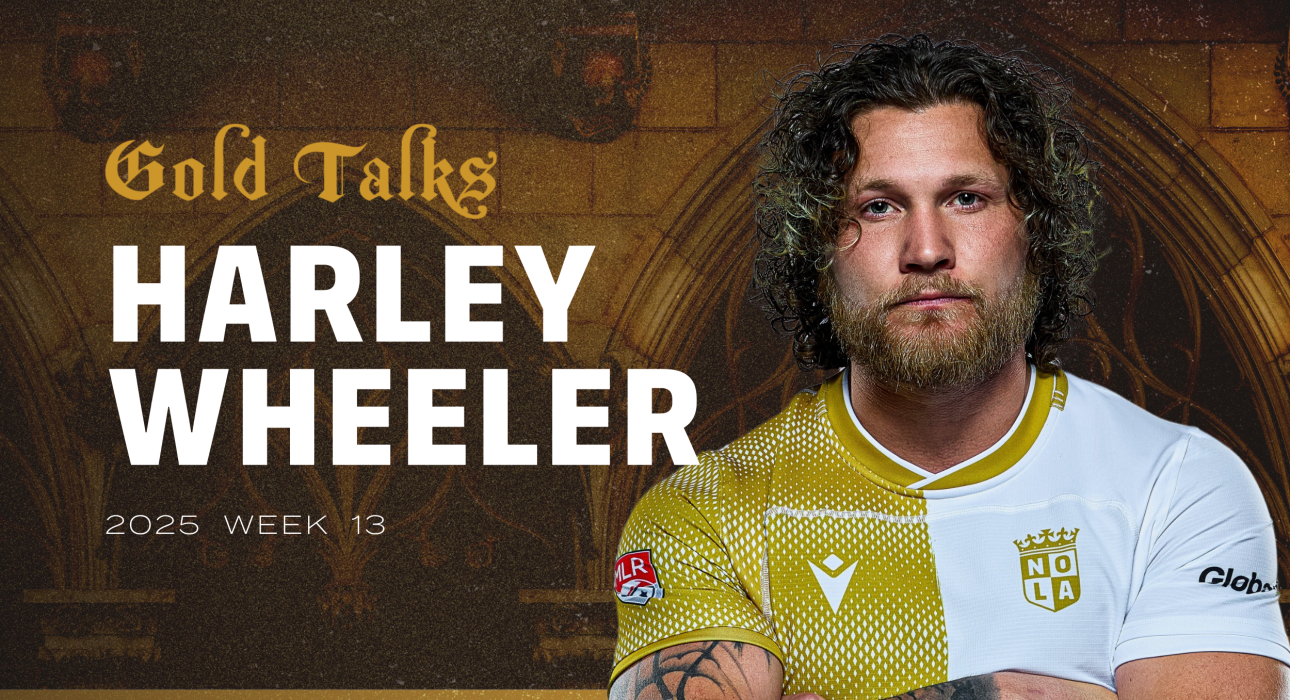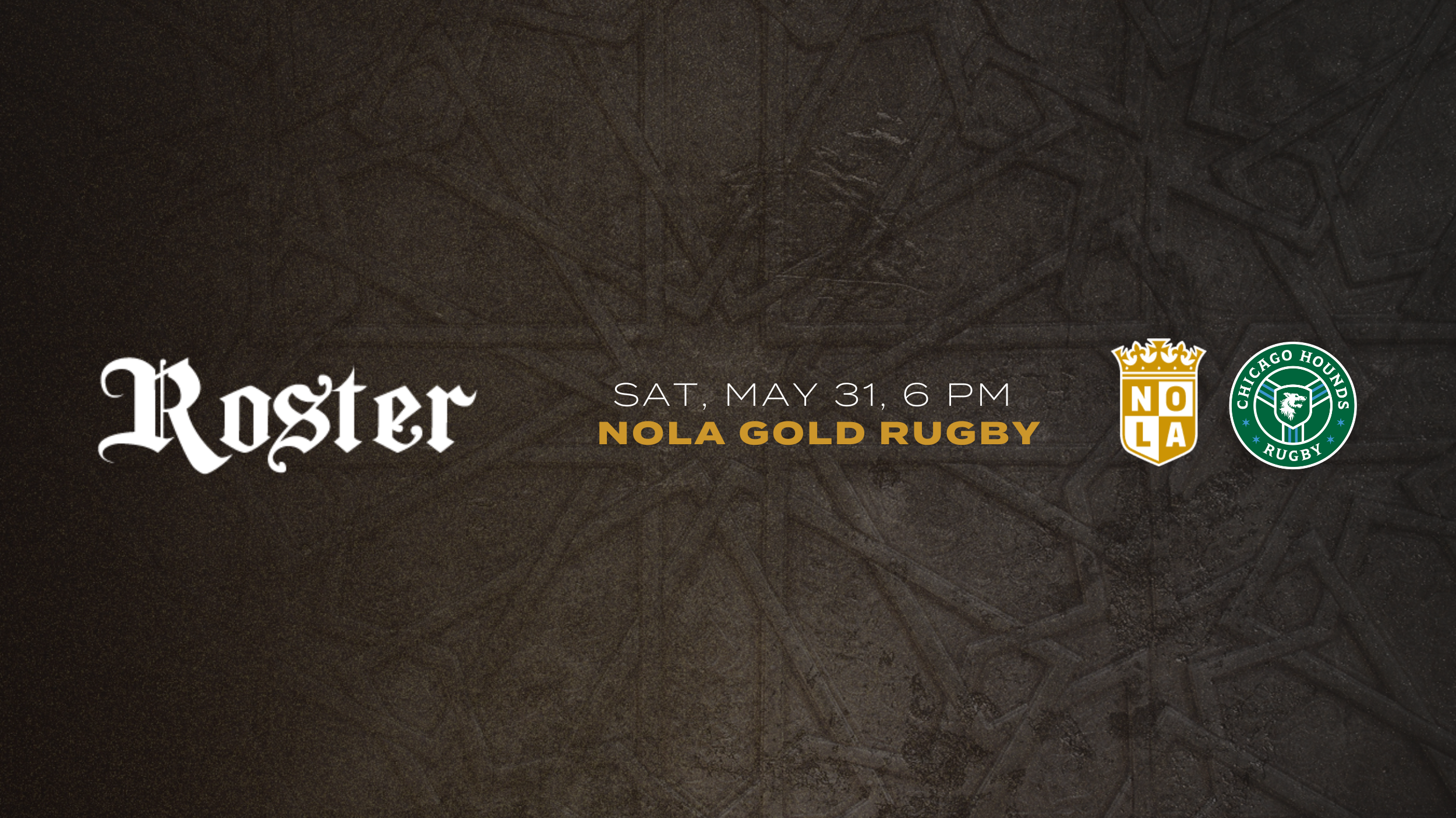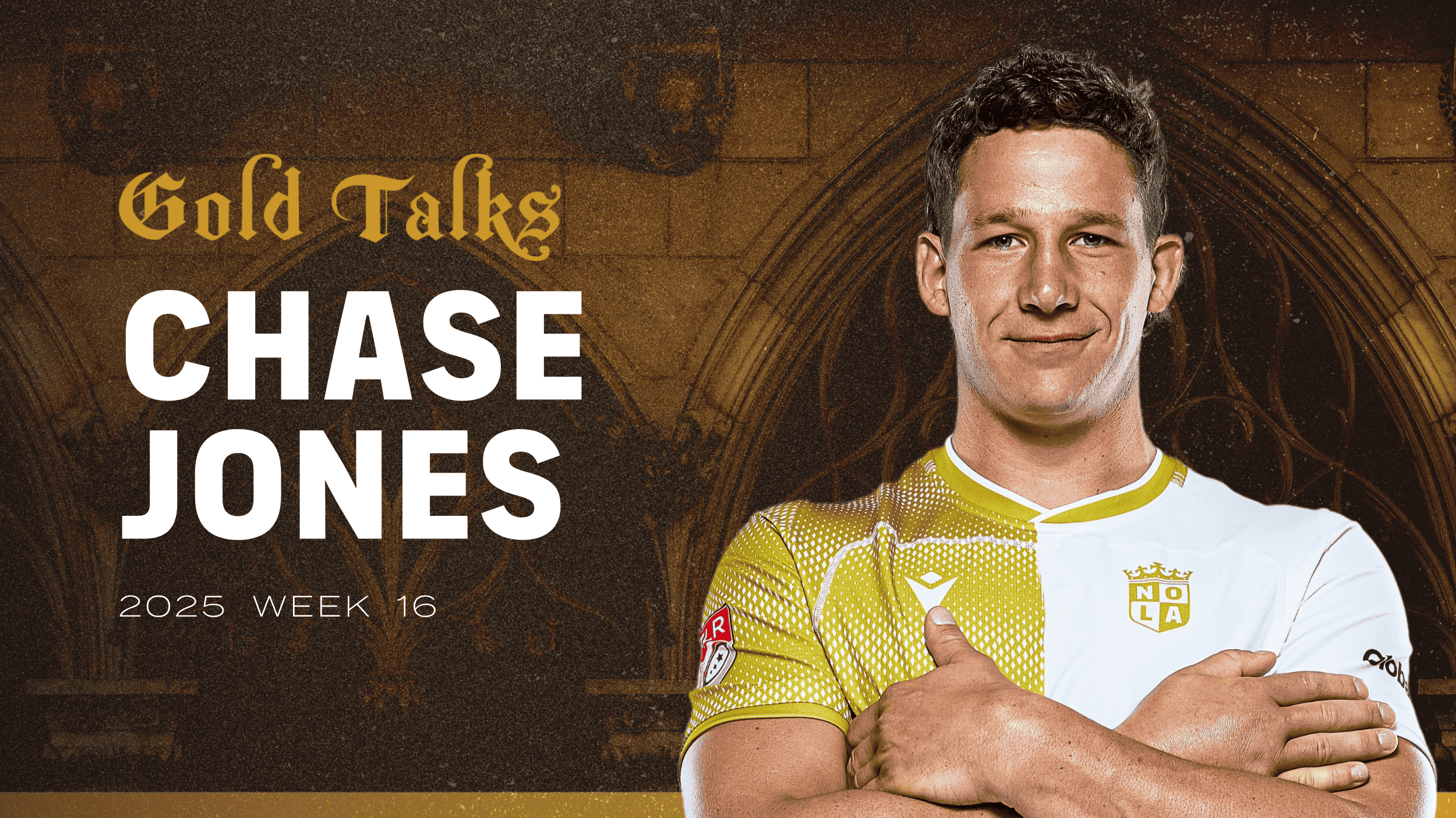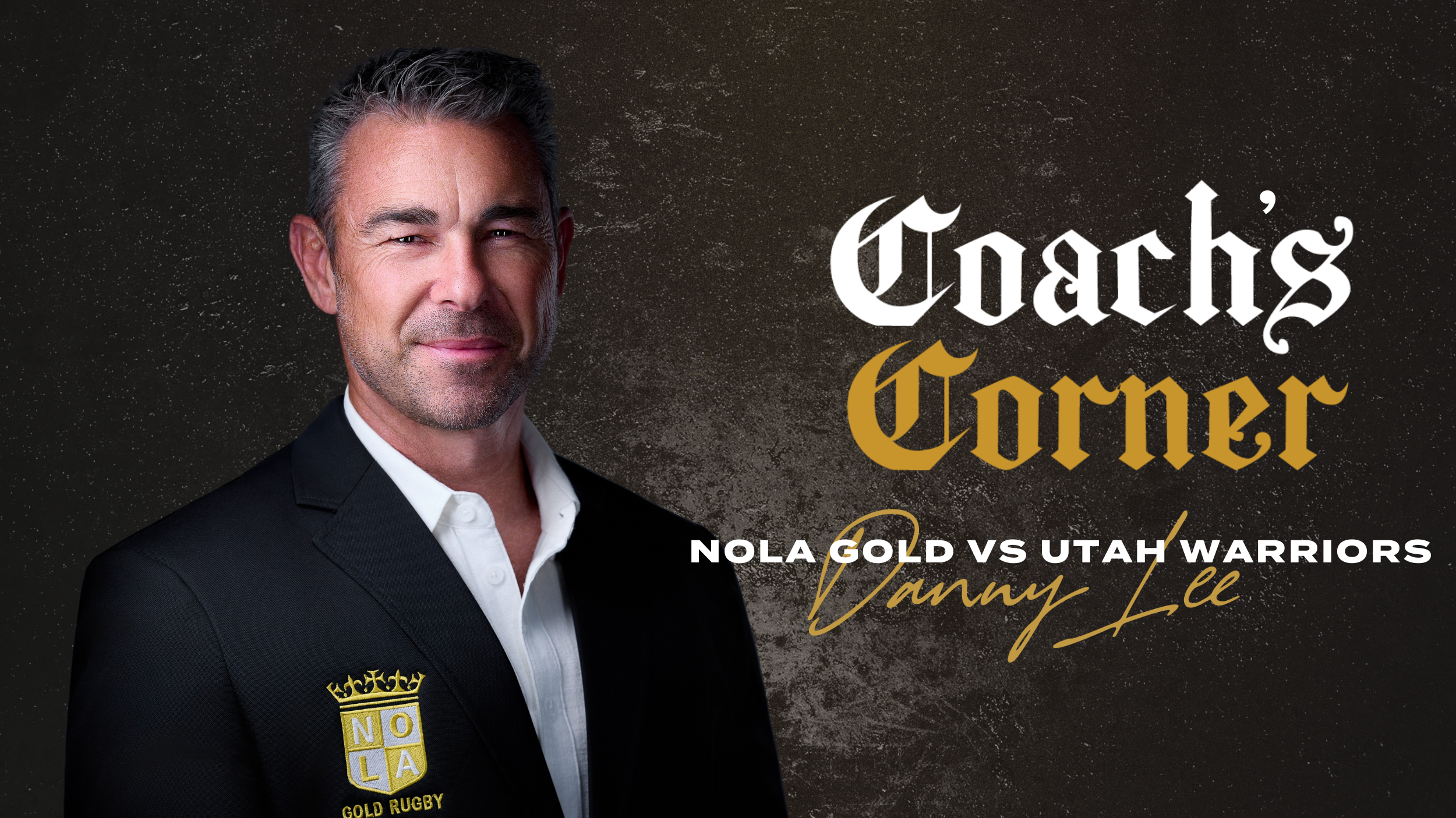An exclusive interview with Harley Wheeler
In this candid GOLD Talks interview, NOLA Gold’s Harley Wheeler reflects on his two-try performance against San Diego, the differences between sevens and fifteens, his leadership role, and what it will take to bring home a win against Miami.
Q: You were picked for last week’s roster and delivered an incredible performance, scoring two tries against San Diego. Can you share how it felt to get back out on the field?
Harley Wheeler: It felt good. We’re all working day in and day out to play the game we love. To get the opportunity to go out and show your skills and who you are as a player, and then being able to put points on the board for your team, it’s probably one of the best feelings you can get when you’re on the field.
Q: You’ve played both sevens and fifteens — how do you view the two?
Harley Wheeler: Sevens and fifteens are very different in a rugby aspect. Sevens, you can rely on a little more of your athleticism and skill set to push you further. Fifteens is more structured and organized, so it’s more of a mental game within a match versus sevens. Sevens is about playing, and whenever the opportunity arises, you capitalize. Fifteens, you’re setting everything up and preparing yourself to score, so there’s much more preparation. Fifteens is like chess, and Sevens to me is like checkers.
Q: The match against San Diego was full of momentum shifts. In your view, what were the key factors that contributed to the team’s loss despite a strong performance?
Harley Wheeler: We talked about DAPs (dumba** penalties). It’s been a thing all season. Many of us contribute in ways that ultimately take the momentum away from us in a match. It’s the small things that have a snowball effect. Even though we played an unreal game, we have to bring the penalty count down and continue not to snowball effect our mishaps or bad penalties. We have to switch that on the opposition’s end and have them piggybacking off their mistakes.
Q: Have you always played wing, or did you transition into the position over time?
Harley Wheeler: In high school, I played center, and then, going into college, I went to Life University, one of the best rugby schools in the country, in my opinion. They put me on the wing because I didn’t have that skill set as a center at that level of play yet. So, from college, I’ve always played wing, but then, in my senior year of college, I played center because I was more of a captain and leader within the team, so they wanted me to put myself in that role. But I love wing, I’ve mainly played wing my entire rugby career.
Q: If you could change one thing about how rugby is perceived or structured in the U.S., what would it be and why?
Harley Wheeler: I would change that it is viewed as being super dangerous. I coach high school rugby in Louisiana for East Jeff, and many of the kids I try to recruit in high school, their parents won’t let them play because they think it’s so dangerous, because there’s no protective equipment. I tell those kids to let people know that pads and protective equipment are almost a false sense of protection. If I gave you a helmet and told you to hit your head against the wall, you would hit it pretty decently cause you think you have a helmet on, so it’s safe. But if I took that helmet off and told you to do the same thing, you wouldn’t hit it as hard. In my opinion, I just wish people understood it’s controlled aggression. It’s not straight-out aggression, and it’s not as dangerous in our eyes as it is to other people.
Q: What does a typical game week look like for you, both physically and mentally, leading up to match day?
Harley Wheeler: After a game, at the beginning of the week, you’re just reviewing how we played, what our mistakes were, what we did well, and then leading up after that, you start previewing and mentally prepping yourself for the team to come. If I’m watching film, I watch for cues that specific players do that I know I will be facing. So if a kicker does something specific right before he kicks the ball, I can catch that and watch it in a game. Then, midweek, just physically preparing yourself, whether in the gym or on the field, getting extras in, tackles, high ball, etc. You physically prepare yourself, and then leading up to the game, it’s more of bringing that physicality aspect back down and mentally preparing yourself again. You want to be in the right headspace before going into the game and be as physically ready as possible.
Q: Is there a particular wing that you study to learn from their game?
Harley Wheeler: One of my favorite wings growing up was Alesana Tuilagi. He’s a big Samoan boy. I just implemented my style of play while watching him. He was a very hard runner and tackler, and that’s what I loved about him. I also love Cheslin Kolbe, Jack Nowell, and Israel Folau, so a few caught my eye, but I focused on Tuilagi and Kolbe.
Q: The team faced the Miami Sharks earlier this season in a tight match. What is the team focusing on this time around to ensure a different outcome and come away with the win?
Harley Wheeler: Of course, every team is different at the beginning of the season and towards the end. Mainly, we want to focus on ourselves. We want to know what the other team is doing, but we also want to bring down our mistakes and penalty count. Our coach talks about penalty count because the team with the least amount of penalties will probably be the one on the winning side, so we’re mainly focusing on us and what we can accomplish because we’re starting to gel with our attack. Our defense is coming together well, too. Mainly just focusing on our attack, how we can get better in phase play, strikes, etc. It’s all about us in the end, so we’re just heading forward and focusing on us right now.
Q: You’re a big presence on and off the field — always involved, outgoing, and active in team events. How did you grow into that leadership role within the squad?
Harley Wheeler: You just get asked for it, then you put your hand up. The majority of the guys don’t like putting themselves out in that front, but the more that we show ourselves, the better. If we make ourselves as apparent as possible, that will grow our name and brand, so I can do that. I’m always ready to help because I want to see success within NOLA Gold and in New Orleans rugby in general, so I try to help in any way I can.
Q: What’s been your favorite memory of the season so far?
Harley Wheeler: This was the first year we could have Mardi Gras week off. It was my first time going out and having fun and letting loose during Mardi Gras week without worrying about a game on the weekend. My best memory was waking up at 7 AM on Fat Tuesday and then just having a time with the boys. It was almost the entire team, besides a select few who had to go home to see family, so that’s my top memory.
Rapid fire questions
What’s your gas station order?
First off, I’ll have Hot Cheetos, automatically. If they have it, I’ll have a Mountain Dew Icee. Lastly, I’m a big ice cream guy, so I’ll probably have a half-pint of Ben & Jerry’s.
Who was your favorite performer at Jazz Fest?
Lil Wayne and the Roots 100%.
Salty or sweet snacks?
That’s tough, can I go salty and sweet? A bit of both.
What’s your biggest pet peeve?
I hate being patted. I used to be really small, and I hated it as a kid when adults would pat me.
Coffee or energy drink before kickoff?
Energy drink.
Stay tuned for more exclusive Gold Talk interviews as we follow NOLA GOLD’s journey through the season! Plus, don’t miss out on the action—get your tickets now and cheer on NOLA GOLD at their next home match!




